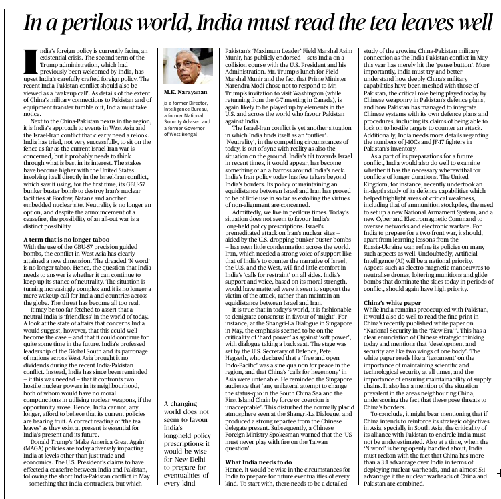1. Context and Premise:
- The world is entering a high-risk phase geopolitically, economically, and in terms of security.
- Global power centers like the S., China, Russia, and the EU are undergoing transitions or realignments, while multilateralism is weakening.
- Old alliances are fracturing; new power dynamics are replacing the earlier balance.
- India’s role as a regional and emerging global power is under test in this changing world.
2. Key Issues Highlighted:
A. Fractured Global Order:
- The decline of U.S. global dominance, rise of China’s assertiveness, and Russia’s resurgence have shaken the post-Cold War order.
- Global institutions like the UN and WTO are becoming less relevant, and consensus-based decision-making is losing strength.
B. Weaponization of Everything:
- Trade, currency, technology, and even energy are being weaponized.
- Cyber threats, disinformation, and AI warfare have added new dimensions to global security.
C. China’s Global Ambitions:
- China’s Belt and Road Initiative and militarization in Indo-Pacific pose direct strategic challenges.
- India’s border tensions with China and geopolitical competition in South Asia and the Indian Ocean are intensifying.
D. India’s Dual Challenges:
- India is sandwiched between Chinese assertiveness and uncertain Western support.
- It faces the dilemma of maintaining strategic autonomy while managing strategic dependencies (e.g., on Russia for defense, on the West for technology/markets).
3. Policy Recommendations & Strategic Direction:
A. Strategic Forecasting:
- India must read global trends (‘tea leaves’) accurately, predict shifts in power, and pre-empt diplomatic setbacks.
B. Reimagining Diplomacy:
- Need for bolder, less reactive foreign policy.
- India should craft alliances beyond traditional groupings (e.g., strengthen QUAD but also engage the Global South).
C. Internal Cohesion & Global Image:
- Global leadership demands a coherent domestic policy and commitment to liberal democratic values.
- India’s internal stability and democratic robustness affect global perception and credibility.
D. Technological & Economic Resilience:
- Investing in AI, cybersecurity, space, quantum tech is crucial.
- Economic resilience will determine India’s long-term strategic autonomy.
UPSC MAINS QUESTION (10 Marks | 150 Words)
- In the context of a fragmenting global order and shifting power dynamics, critically examine how India can maintain strategic autonomy while expanding its global leadership.


